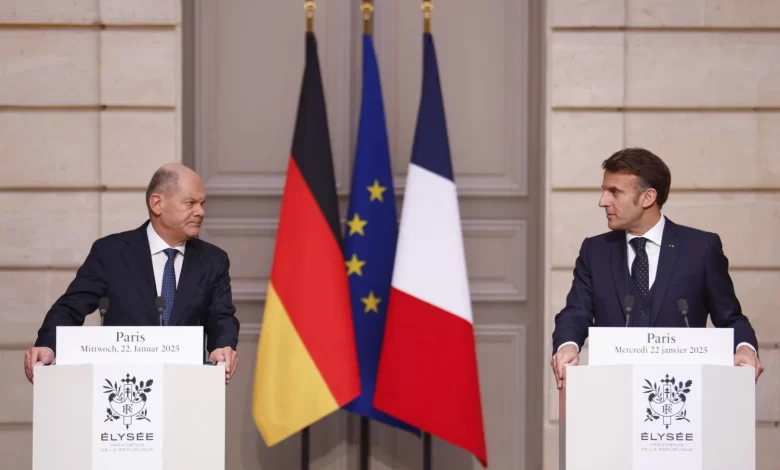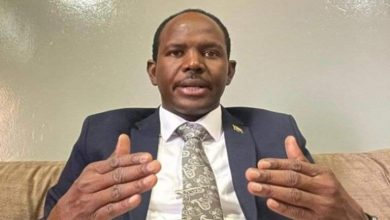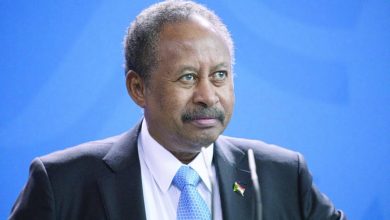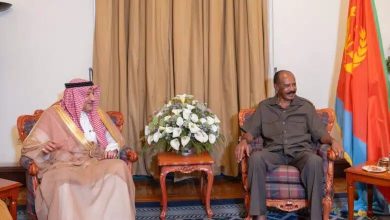Macron and Scholz Discuss Ways to Confront Trump’s Pressures and Protect Europe

Day by day, European concerns are rising over the possible return of President Donald Trump to the White House for a second term, with a program that is clear about what he wants from the old continent, whether regarding economic and trade relations, NATO, or his stance on the Russian-Ukrainian war, which will enter its fourth year in a month.
As a result, the primary topic in European meetings at all levels since November 5 of last year has been focused on what the European Union must do to confront the upcoming “American onslaught.” This was evident at the “Davos” Economic Summit, and it was also clear during the meeting between French President Emmanuel Macron and German Chancellor Olaf Scholz on Wednesday in Paris, held to celebrate the 62nd anniversary of the French-German Friendship Treaty, signed by General de Gaulle and Chancellor Konrad Adenauer at the Élysée Palace.
In statements by Macron and Scholz, it was clear that the American issue dominates their concerns, though with a notable difference. While Macron was “decisive” in his remarks, Scholz sought to keep all doors open for reaching an understanding with the occupant of the White House.
So far, EU officials appear to be torn between reminding everyone that the EU has the ability to defend itself and respond to American actions, and showing a willingness to be flexible toward Washington while waiting for clarity on the U.S. administration’s policy. They also want to see if Trump’s threats to impose heavy tariffs on European exports will come to fruition or if he is using them as leverage to push Europeans to change their approach to trade and economic relations with the U.S.
There are several messages, the first one being directed to Europeans, emphasizing the importance of European unity in facing what is coming from the other side of the Atlantic. Macron stated, “After the installation of a new administration in the United States, it is more important than ever for Europeans to play their role in strengthening a united, strong, and sovereign Europe,” adding that “the only response Europeans expect is more unity, more ambition, and more independence.” The Europe Macron advocates for is one that, on the one hand, “values Atlantic relations,” but at the same time knows how to “defend its own interests based on its values and available tools.”
Macron continued, saying, “Europe’s priority must be to defend fair competition, provide security and prosperity to its citizens, promote democracy, and preserve the European economic and social model,” thus illustrating the stark difference between Trump’s vision and the traditional European approach.
On the other hand, Scholz used “double language,” as he did not hesitate to describe Trump’s return to the White House as “a challenge,” which is already evident, and therefore, Europe must be strong and able to persevere in a changing world. However, at the same time, he rushed to affirm that “a strong friendship binds the U.S. and Europe, and on this basis, we want, with our American partners, to continue building together.” Scholz added, “Our position is clear: Europe is economically vast, consisting of 450 million citizens, and we are strong. We will be reliable partners to the U.S., and we will have good cooperation with America and the new president.”
Germany and France are the two largest economic powers in the European Union, which is why what Scholz and Macron say is of great importance. It is also worth noting that European Commission President Ursula von der Leyen adopted similar language to that used by the two European leaders, fluctuating between firmness, threatening retaliatory actions, and emphasizing the intention for dialogue and continued partnership with the U.S.
In response to Trump’s threats, Macron called for supporting the steel, automotive, chemical, and French agricultural sectors, which are essential to European exports to the U.S. The trade balance tilts in favor of the old continent, which exports an average of 520 billion euros while importing around 350 billion from its American partner.
The Ukraine war was not absent from the European leaders’ discussions. While Trump is expected to launch an initiative regarding it, Scholz and Macron were keen to reaffirm Europe’s positions, with Scholz stating that Ukraine “can count on us, as we will not abandon our support for it in the face of Russian aggression.”
Macron, for his part, indicated that one of Europe’s main goals is to defend its interests, work for peace and stability in its surroundings, and continue supporting Ukraine in determining the conditions for a just and lasting peace. While Scholz hoped for an end to this “horrible war,” the condition for that is for Kyiv to be in a strong position. Macron and Scholz’s words were directly aimed at President Trump, who during his election campaign had insisted on the need to reduce financial and military aid to Kyiv, claiming he could end the war “in 24 hours” without specifying how or under what conditions. The European concern is that Trump may seek a “deal” with Russian President Vladimir Putin that would not satisfy Ukrainians and might be made “behind Europe’s back,” threatening the security, safety, and stability of Europe.
The third message from European officials addresses NATO, in light of European fears about the potential U.S. withdrawal or failure to comply with the founding agreement. Trump criticizes Europeans for not contributing enough to the alliance’s defense budget, going so far as to demand that they allocate 5% of their GDP to defense, a target that is difficult to achieve, especially considering that the current goal is to reach 2%.



